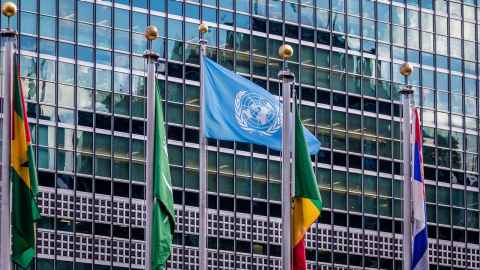What happened to the UN sustainability goals?
24 July 2019
Opinion: Despite encouraging progress, much more needs to be done to turn sustainable development goals into a global reality, writes the UN’s Friedrich Soltau.

Countries met last week at the United Nations in New York for the annual review of progress in implementing an ambitious set of commitments known as the sustainable development goals (SDGs).
A group of 47 countries, among them New Zealand, presented detailed reports of their actions taken to achieve the SDGs.
Back in September 2015, world leaders met at the United Nations and committed themselves to an ambitious framework for tackling the world’s most pressing problems. Known as the 2030 Agenda for Sustainable Development, it contains the 17 SDGs, which translate the broad concept of sustainable development into concrete goals and specific targets.
From Goal 1 on the eradication of poverty, to SDG 16 on peaceful societies, access to justice and effective institutions, the SDGs set out a way forward for the international community. The time horizon for the Goals is 2030.
The SDGs are universal, giving expression to the commitment of all countries - whether rich or poor - to achieve sustainable development, while recognising that countries face different national circumstances.
Traditionally, international action plans and commitments have focused on what governments do. The SDGs are different. While governments still have the primary responsibility, the SDGs will not be achieved without the contributions of all sectors of society, including youth, the academic community, the private sector, and other civil society groups of all kinds. And unlike general statements of sustainability, the 17 SDGs have associated targets, drafted to be SMART – specific, measurable, attainable, relevant, and timely.
A foundational principle guiding the implement of the SDGs is the commitment to leaving no one behind. This reflects a commitment to human rights and the principles of equality and non-discrimination. It means that when policies are designed and implemented the situation of the poorest and most vulnerable must be front and centre.
The SDGs are integrated and inter-linked. Simply put, pursuit of individual goals in an uncoordinated manner increases the probability that synergies will be missed and, even worse, lead to policies that work at cross-purposes to each other. For example, a policy to set aside land for planting trees (afforestation) as carbon sinks, needs to be consider issues such as the land rights of existing users, agricultural use of the land to grow food crops, or the impact of fast-growing trees on water resources.
The 2030 Agenda also sets out a process for the international follow-up and review of the SDGs. Under the voluntary national reviews (VNRs), countries carry out a review of their progress in implementing the 2030 Agenda, presenting their experiences and lessons learned to other countries at the High-level Political Forum (HLPF), which meets annually in July. By the completion of this year’s Forum, more than 150 reviews will have been carried out, since the inaugural reporting in 2016.
This year New Zealand joins the countries preparing voluntary national review. Its report outlines the country’s highlights and areas of focus, such as an emphasis on wellbeing, as well as issues of concern, such as child poverty and rising emissions from transport.
Globally and nationally, monitoring of the SDGs depends on accurate and timely data. This has required the development of new indicators, placing increased demand on national statistical offices. Tracking SDG implementation has also generated interest in new forms of data and user- and citizen-generated data, which have the potential to complement official statistics.
Encouraging progress has been notched up, but much more needs to be done to turn the SDGs into reality across the world, in all countries, with the widest possible involvement of stakeholders.
Friedrich Soltau is Senior Sustainable Development Officer in the UN Department of Economic and Social Affairs. He was a guest at the Law School.
This article reflects the opinion of the author and not necessarily the views of the University of Auckland.
Used with permission from Newsroom What happened to the UN sustainability goals? on 24 July 2019.
Media queries
Alison Sims | Research Communications Editor
DDI 09 923 4953
Mob 021 249 0089
Email alison.sims@auckland.ac.nz